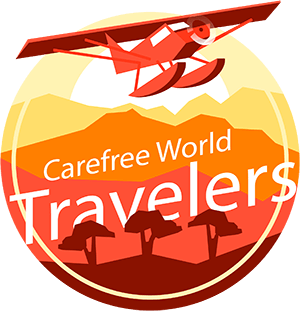6 Travel Scams to Watch Out For
Travel Alert! Your next soft adventure travel vacation could be ruined by **Scammers**!
Eager to immerse yourself in local culture and navigate the uncharted territories of self-guided tours, there’s a sneaky villain lurking in the shadows, waiting to pounce on your naivety. **Scammers**. Those masters of manipulation, armed with cunning tactics, can turn your dream vacation into a financial nightmare. But we have some tips for you to avoid falling prey to these scammers! Based on our personal experiences as well as networking over the years with like-minded carefree world travelers, we’ve isolated the **six most notorious travel scams**. We’re sharing with you our insider knowledge to outsmart these crooks and enjoy a stress-free, thrilling journey.
Scam 1: The Fake Hotel Booking

While planning your dream trip, you’re probably excited to book that perfect hotel room with a stunning view of the local culture. But, beware, because scammers are lurking in the shadows, waiting to ruin your experience!
How it Works
You search for hotels online, and a website that looks legit pops up, offering you an incredible deal. You book the room, and they ask for your credit card information. But, here’s the thing: the website is fake, and your credit card info is now in the hands of cybercriminals.
Red Flags to Watch Out For
Booking a hotel room should be a breeze, but when something feels ‘off’, trust your instincts. Be cautious of websites with poor grammar, low-resolution images, or no clear contact information. If the deal seems too good to be true, it probably is!
For instance, if you’re booking a hotel in a popular tourist destination, but the website is offering a rate that’s significantly lower than the rest, it’s likely a scam. Also, be wary of websites that ask for your credit card information immediately. Legit hotels will usually redirect you to a secure payment gateway or provide alternative payment methods.
So, how can you avoid falling prey to this scam? Always book your hotel rooms through reputable websites like Booking.com, Expedia, or directly with the hotel’s official website. And, remember, if it seems too good to be true, it probably is. Be cautious, and you’ll be sipping margaritas by the pool or exploring a local market in no time!
Scam 2: The Overly Friendly Local
You’re strolling through a bustling market, taking in the vibrant colors and exotic aromas, when suddenly, a friendly local approaches you with a warm smile. They strike up a conversation, asking about your trip and offering to show you around. Sounds harmless, right? Think again.
The Art of Distraction
Diversions are the name of the game here. Your new “friend” might point out a fascinating landmark or street performer, all while subtly lifting your wallet or slipping their hand into your pocket. Meanwhile, an accomplice might create a commotion to further distract you. It’s a clever tactic, but stay vigilant, and don’t let your guard down, even for a second.
Protecting Your Valuables
Be on guard against pickpocketing and theft and keep your valuables secure and out of sight. Wear a money belt, keep your purse or backpack zipped, and avoid flashing expensive jewelry or watches. Remember, a little paranoia goes a long way when traveling.
Friendly locals can quickly turn into sneaky thieves, so it’s vital to keep your wits about you. When interacting with overly friendly strangers, trust your instincts. If something doesn’t feel right, politely excuse yourself and move on. Don’t let the fear of being rude hold you back from protecting yourself. After all, you want to make the most of your time to experience the local culture and enjoy your Soft Adventure Travel. Although we prefer to plan our own sightseeing when traveling, we do occasionally join a guided tour to take advantage of learning from an expert guide and also minimizing our risk of falling prey to scams like this.
As carefree world travelers, it’s always better to err on the side of caution. Stay informed, stay alert, and you’ll be well on your way to a scam-free adventure.
Scam 3: The Currency Exchange Rip-Off
Some travelers might think they’re getting a great deal on currency exchange, but in reality, they’re being taken for a ride. Scammers prey on unsuspecting tourists, often using tactics like rigged exchange rates, fake currency, or even stealing your cash outright.
Spotting the scammer
On the streets, these scammers often pose as helpful locals or officials, approaching you with an “unbeatable” exchange rate or warning you about counterfeit bills. Be wary of anyone who initiates a conversation about exchanging money, especially if they’re being overly friendly or pushy.
Safe exchange practices
Currency exchange should always be done at authorized dealers, such as banks or reputable exchange offices. Avoid exchanging money on the street or with individuals, no matter how convincing they may seem.
Avoiding shady currency exchange dealers is crucial to protecting your hard-earned cash. When exchanging money, always count your cash carefully and never leave your money unattended. Additionally, research the current exchange rates beforehand to ensure you’re getting a fair deal. Being vigilant and prepared, you can avoid falling prey to these scammers and enjoy your travel experience without worrying about your finances. We have found Managers and Front Desk staff at our hotels to be very helpful in recommending reputable currency exchange dealers so check with them first.
Don’t forget, as a savvy traveler, it’s important to stay informed and proactive when it comes to protecting your money. By being aware of these common scams, you can focus on what really matters – exploring new destinations and creating unforgettable memories.
Scam 4: The Lost or Stolen Luggage
Your luggage is your lifeline when traveling, and losing it can be a major setback. Scammers know this and have come up with ways to take advantage of unsuspecting tourists. According to Top 10 travel scams to watch out for, this scam is particularly prevalent in airports and train stations.
Here’s how it works: a scammer will approach you, claiming to be an airport or train station official, and tell you that your luggage has been damaged or lost. They’ll then offer to help you fill out a report or take you to a special office to resolve the issue. Meanwhile, their accomplice will steal your luggage or valuables while you’re distracted.
Prevention is key
Avoiding this scam is relatively easy. Always keep a close eye on your luggage or, if traveling with a family member or friend, make sure one person is minding the luggage at all times, especially in crowded areas. If someone approaches you claiming to be an official, don’t panic. Instead, politely decline their help and seek out a legitimate airport or train station employee.
Tracking devices such as AirTags and Tiles have become popular and might give you a sense of security, particularly when checking bags at Airports during your trip. However, luggage thieves can easily disable or remove these devices. Even if you track your luggage and tell the airlines exactly where it is, there is no guarantee that you will get your luggage more quickly! If you are interested in adding this layer of security to your luggage check out CNN’s article: 8 best luggage trackers and tags https://edition.cnn.com/cnn-underscored/travel/best-luggage-tags-trackers#:~:text=Eufy%20SmartTrack%20Link&text=One%20of%20our%20favorite%20features,attach%20it%20to%20your%20keys.
What to do if it happens to you
Prevention is always better than the cure, but if your luggage does get lost or stolen, stay calm and act quickly. Report the incident to the authorities and your airline or travel insurance provider immediately. Make sure to keep a record of your belongings and their value, as this will come in handy when making a claim. We always put our business card or contact information inside our bags incase they get lost and the tag is missing.
A good travel insurance policy can be a lifesaver in situations like this. It’ll cover the cost of replacing your lost or stolen items, as well as any additional expenses you incur while waiting for your luggage to be returned. When choosing a policy, look for one that covers soft adventure travel, such as hiking or biking, as well as local culture experiences, like food tours or museum visits. This will ensure you’re protected no matter what type of travel you’re doing.
Keep in mind, as a carefree world traveler, it’s crucial to be aware of your surroundings and take necessary precautions to avoid scams like this. By staying informed and taking the right steps, you can focus on enjoying your trip and immersing yourself in new cultures, rather than worrying about your luggage.
Scam 5: The Fake Wi-Fi Hotspot
Once again, you’re on the go, navigating foreign streets, and suddenly, your phone beeps with a Wi-Fi network invitation. You think you’ve hit the jackpot, but think twice before connecting. This scam is as old as the internet itself, but it still catches many travelers off guard.
When exploring new destinations, it’s imperative to stay connected with family, friends, and your travel plans. But, public Wi-Fi networks can be a breeding ground for cybercriminals. Be cautious, fellow travelers!
The dangers of public Wi-Fi
Perils lurk in every public Wi-Fi hotspot. Hackers can easily intercept your data, including sensitive information like passwords, credit card numbers, and personal details. Your digital identity is at stake!
How to stay safe online
Fake Wi-Fi hotspots are everywhere, but with some know-how, you can outsmart them. Verify the network name before connecting, and always opt for secure networks that require a password.
This is where being a savvy traveler comes in handy. When in doubt, ask your accommodation provider or a reputable store such as a travel agency if the network is legitimate. Better safe than sorry! Additionally, consider investing in a portable Wi-Fi hotspot or a Virtual Private Network (VPN) to ensure your online activities are encrypted and secure. Stay protected, stay carefree! With these simple precautions, you’ll be able to explore the local sites and culture without worrying about your digital security.
Scam 6: The Overpriced Tourist Trap
 To avoid falling prey to this scam, you need to be aware of the tactics used by unscrupulous tour operators who prey on unsuspecting tourists.
To avoid falling prey to this scam, you need to be aware of the tactics used by unscrupulous tour operators who prey on unsuspecting tourists.
They promise you an “authentic” experience, but what you get is a watered-down, overpriced version of local culture. They’ll take you to overpriced restaurants, shops, and attractions, all while claiming it’s a “unique” experience. But trust us, you’re not getting the real deal.
Research, research, research
Any seasoned traveler will tell you that research is key to avoiding scams. Don’t rely on glossy brochures or websites that promise the world. Instead, dig deeper and read reviews from multiple sources. Tripadvisor is a good place to start. Look for red flags like poor ratings, complaints about overpricing, or fake reviews.
Avoiding the tourist trap
Any self-respecting traveler wants to experience the local culture, not some manufactured version of it. To avoid the tourist trap, plan your own tour or join a reputable tour operator that focuses on soft adventure travel. This way, you’ll get to experience the real deal, without breaking the bank.
The key to avoiding the tourist trap is to be open-minded and flexible. Don’t be afraid to venture off the beaten path and explore on your own. You’ll be surprised at the hidden gems you can discover when you’re not tied to a tour group. And remember, local culture is not something that can be bought or sold; it’s something that needs to be experienced firsthand. So, take your time, soak up the atmosphere, and engage with the locals. That’s where the real magic happens.
Having spent many years in the travel industry as owners, marketers and tour guides we understand the importance of experiencing local culture without the hefty price tag. That’s why we now prefer to handle most of the travel arrangements for our personal travel. We book a few hotel nights when we first arrive at a destination to familiarize ourselves with the area and then move if necessary. Having planned our sightseeing prior to arrival we contact local tour operators for specific day trips to sites that we feel warrant expert explanation, for instance The Temples of Angkor Wat or the Pyramids of Mexico. Otherwise, we make our own arrangements using local transportation. We encourage you to join us on a journey of discovery and experience the real deal!
Conclusion
Now that you’ve made it through this gauntlet of travel scams, you’re better equipped to navigate the exciting world of soft adventure travel with your wits about you. Of course, the key to avoiding these cons is to stay vigilant, do your research, and trust your instincts.
However, if you are a regular “carefree world traveler” like us, there is always a chance that you’ll be scammed! During one of our six month visits to Southeast Asia we were scammed by a taxi driver in Hanoi who quickly changed the meter and throught we didn’t notice! After arguing and threatening to report the driver to the Police we negotiated a price that was more than we should have paid but a lot less than the driver had demanded! Don’t let incidents like this spoil your adventure!

